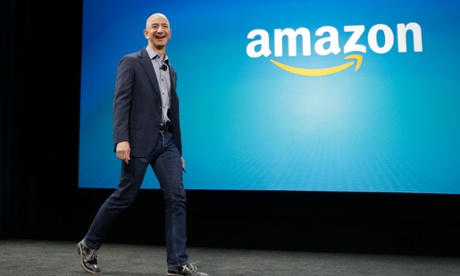
Amazon has hit back after an open letter from more than 900 authors criticising its licensing dispute with publisher Hachette, which was published as an ad in the New York Times.
However, the latest blog post from the “Amazon Books Team” is raising eyebrows within the publishing industry due to its use of a partial quote from George Orwell in support of its cause.
The open letter from “Authors United” – signed by writers including Donna Tartt, Stephen King, Philip Pullman and Malcolm Gladwell – called on Amazon to stop blocking or delaying sales of Hachette books while negotiating a new distribution deal with the publisher.
“We have made Amazon many millions of dollars and over the years have contributed so much, free of charge, to the company by way of cooperation, joint promotions, reviews and blogs.
This is no way to treat a business partner. Nor is it the right way to treat your friends. Without taking sides on the contractual dispute between Hachette and Amazon, we encourage Amazon in the strongest possible terms to stop harming the livelihood of the authors on whom it has built its business.”
Amazon’s response was published online at the website address readersunited.com, and like the authors’ letter, was addressed to readers.
It reiterated Amazon’s previous claims that the dispute with Hachette is over Amazon’s desire to reduce the price of ebooks, and compared the row to the introduction of paperback books in the 1930s:
“With it being so inexpensive and with so many more people able to afford to buy and read books, you would think the literary establishment of the day would have celebrated the invention of the paperback, yes? Nope. Instead, they dug in and circled the wagons.
They believed low cost paperbacks would destroy literary culture and harm the industry (not to mention their own bank accounts). Many bookstores refused to stock them, and the early paperback publishers had to use unconventional methods of distribution — places like newsstands and drugstores.”
Amazon’s line of argument is that ebooks are no different in 2014, and it cites Hachette’s involvement in recent price-fixing controversies as evidence, noting that the company and its rivals have so far paid $166m in settlements from the case.
The company appears on much less firm ground with its Orwell quote, however:
“The famous author George Orwell came out publicly and said about the new paperback format, if ‘publishers had any sense, they would combine against them and suppress them.’ Yes, George Orwell was suggesting collusion. Well... history doesn’t repeat itself, but it does rhyme...
“When a thing has been done a certain way for a long time, resisting change can be a reflexive instinct, and the powerful interests of the status quo are hard to move. It was never in George Orwell’s interest to suppress paperback books — he was wrong about that.”
Well, he would have been, if the full quote – about publisher Penguin’s introduction of paperback books – hadn’t been this:
“The Penguin Books are splendid value for sixpence, so splendid that if other publishers had any sense they would combine against them and suppress them.”
Several sites have already called Amazon out on its partial quote – notably TechCrunch, which described the decision as “horrible” while noting that “it’s clear that Orwell is praising the paperback, not arguing for its abolition”.
Note, though, that Penguin’s own site portrays the quote in a different light, introducing it with the sentence: “Traditional publishers tended to view Penguin with suspicion and uncertainty, as did some authors.”
Amazon’s blog post finished by publishing the email address of Hachette chief executive Michael Pietsch – a direct response to the Authors United letter’s inclusion of its own CEO Jeff Bezos’ email – encouraging readers to write to him calling for Hachette to lower ebook prices and “stop using your authors as leverage” in the dispute.
Hachette has since responded by publishing the text of the reply that Pietsch is sending to those readers, defending the collusion claim, suggesting that more than 80% of the ebooks his company publishes cost $9.99 or less, and adding that the higher-priced ebooks are “less than half the price of their print versions”.
“This dispute started because Amazon is seeking a lot more profit and even more market share, at the expense of authors, bricks and mortar bookstores, and ourselves.
“Both Hachette and Amazon are big businesses and neither should claim a monopoly on enlightenment, but we do believe in a book industry where talent is respected and choice continues to be offered to the reading public.”
The unusually-public tit-for-tat licensing row looks set to continue for some time, giving that reading public an insight into the power struggle that’s taking place around digital publishing.
Meanwhile, Amazon appears to be embroiled in another dispute with an even bigger media company, Disney. It has halted pre-orders of some Disney films, with the Wall Street Journal suggesting that the cause is another contractual row.
• Hachette ebook sales fall in wake of Amazon dispute
• Amazon tells Hachette to give authors more, charge readers less
• Amazon v Hachette: a fight for readers, writers and retailers

